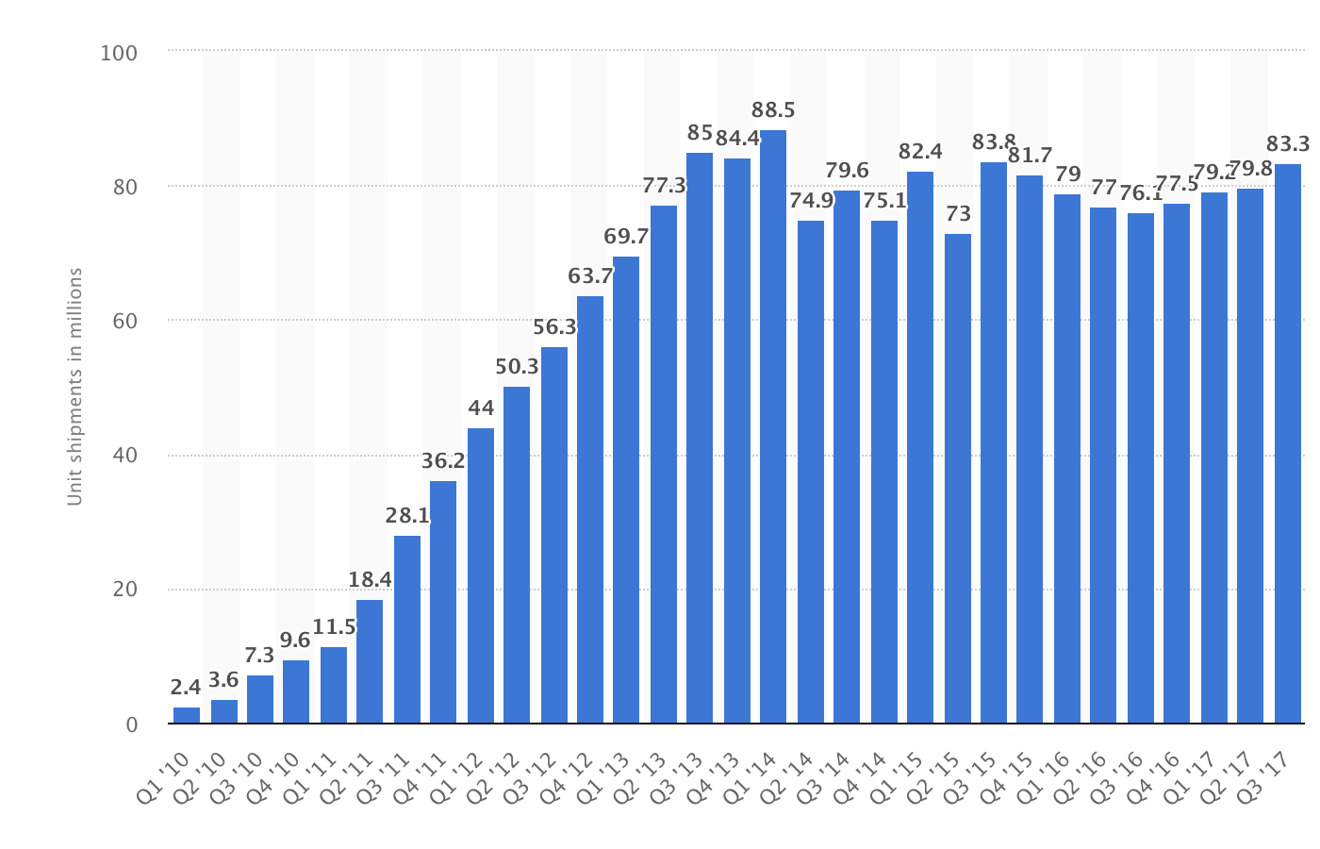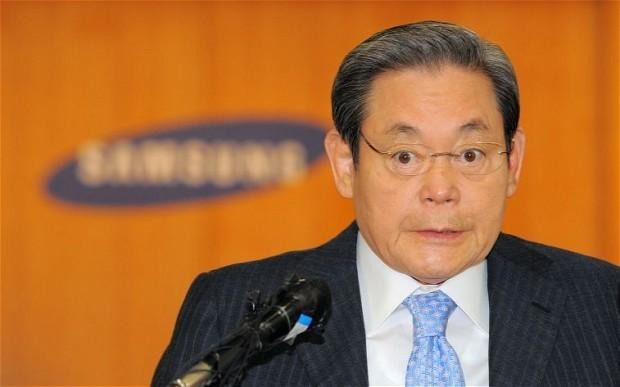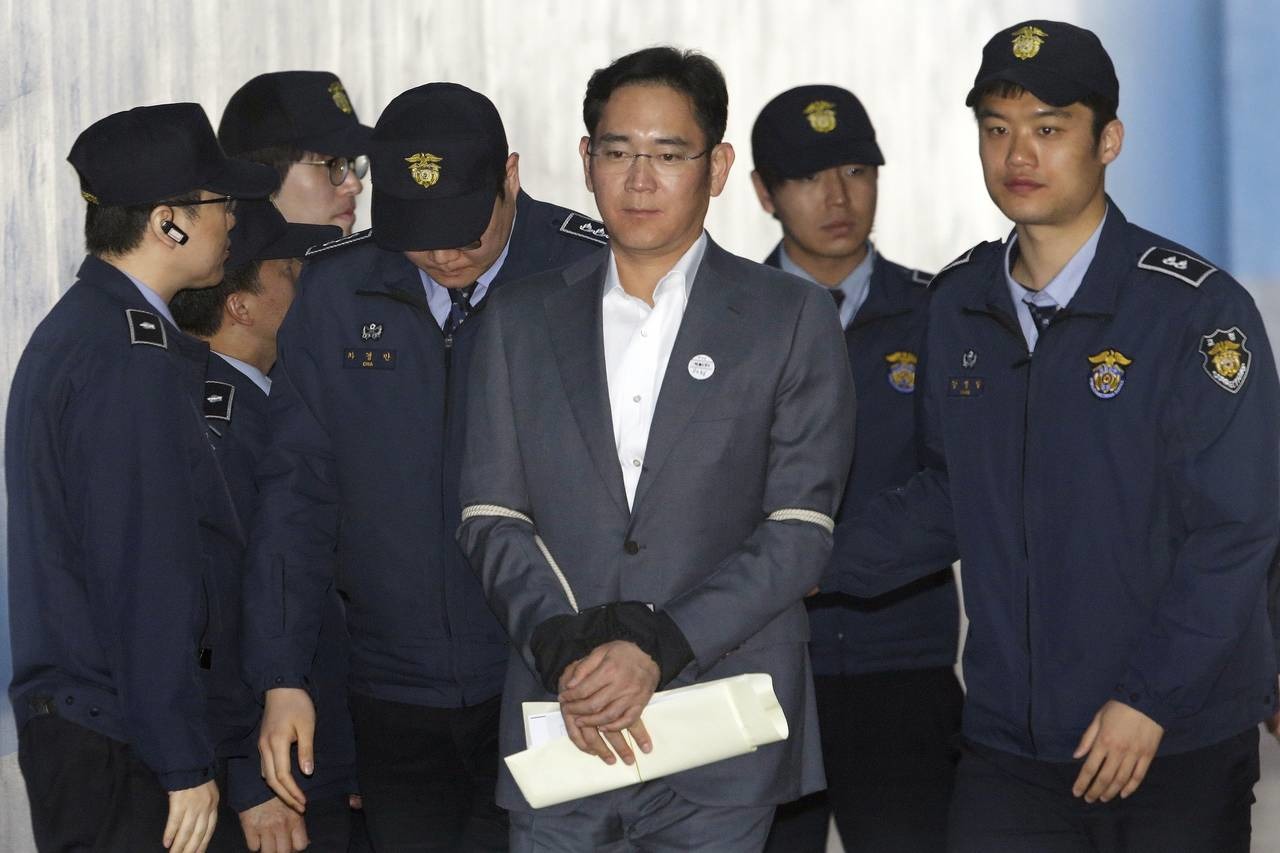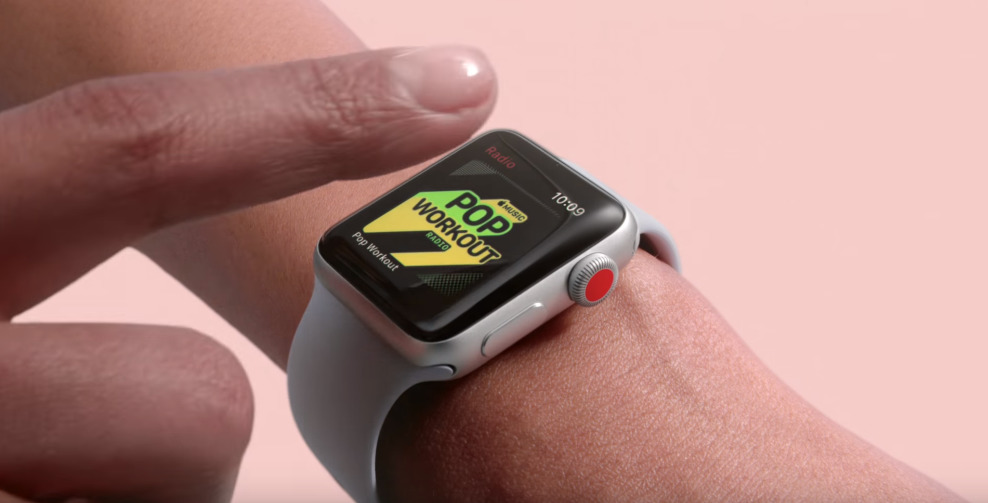A South Korean corruption scandal involving millions of dollars in bribes made by Samsung's de facto leader Lee Jae-yong in exchange for government favors has been conveniently pardoned just in time for Samsung to sponsor the 2018 Pyeongchang Winter Olympic Games.
Lee, Samsung's vice chairman, had been sentenced to five years of imprisonment for his role in the scandal last year. Prosecutors had sought a 12 year sentence. Now, according to ">report by the Wall Street Journal Lee has been freed by an appeals court after being given a shorter sentence that was then suspended.
Lee was still found to be guilty of four of the original five counts (a conviction for hiding assets overseas was overturned), but the dollar value of his bribes was reduced from the initial figure of $8.2 million US to a new number of "just" $3.3 million in government bribes. Lee was released after serving a year in prison, and will now return to business as usual at Samsung. Lee's own father Lee Kun-hee, the chairman of Samsung Group, was similarly convicted in 2008 for tax evasion and pardoned the next year, also for the Olympics.
The Journal noted that "some of South Korea's most powerful corporate tycoons have been convicted for a variety of crimes, with most later receiving a presidential pardon," citing Lee's own father Lee Kun-hee, the chairman of Samsung Group who was similarly convicted in 2008 for tax evasion and pardoned the next year, also for the Olympics.
Other examples of South Korea's justice-pardoning system for the rich and powerful include Hyundai chairman Chung Mong-koo, who was convicted and sentenced to three years in prison for embezzlement in 2007 and pardoned the next year; Hanwha chairman Kim Seung-youn, convicted of embezzlement and paroled within a year; SK Group chairman Chey Tae-won, who was convicted of financial crimes and sentenced to four years, who was pardoned after his sentence was upheld by a high court on appeal; CJ Group chairman Lee Jay-hyun, convicted in 2014 of tax evasion and misappropriating assets to offshore funds, pardoned within two years.
With its leader in jail, Samsung promoted younger business heads
As its vice chairman and heir apparent (Samsung's official chairman remains Lee's father Lee Kun-hee, who has been largely disabled following heart problems four years ago, but has not yet relinquished the ceremonial title) sat in prison, the company has been struggling to rearrange itself in order to find new avenues of growth.
Writing for the Journal, Eun-Young Jeong noted that Samsung "made sweeping changes to its top leadership during Mr. Lee's absence, replacing all its business division heads with relatively younger leaders and separating the role of its CEO and board chairman for the first time."
The report also cited Samsung's former CEO Kwon Oh-hyun, who stepped down last October, as saying that Samsung was "hard-pressed to find new growth areas" while anticipating that new, younger leadership would be "well suited to accelerate the pace of innovation."
Samsung's growth hasn't materialized in consumer products
Samsung's last big year of smartphone growth was back in 2014, when the company reached its all-time Peak Galaxy with the S4, four annual generations into its effort to copy Apple's iPhone. However, after successfully copying Apple's designs with a high degree of shamelessness, Samsung began working on its own original concepts, an effort that didn't work out well.
 Samsung's worldwide smarpthone shipments. Source: Stastica
Samsung's worldwide smarpthone shipments. Source: StasticaAt the same time, Apple's chief executive Tim Cook launched the company's own major divergence in iPhone design with two new iPhone 6 models that took a direct shot at the larger "phablet" phones that Android makers like Samsung had been successfully pursuing to differentiate themselves from Apple's single, hand-sized iPhone model.
With its own crisis of design, and now facing brutal new competition from Apple, Samsung suffered a serious drop in phone sales and never recovered. Apple's iPhone 6 generation experienced a "super cycle" of new sales that the company has effectively matched every year since.
In the most recent holiday quarter, Apple's new iPhone X helped the company beat Samsung in quarterly unit sales, despite iPhone selling at an average of nearly $800 while Samsung's ASP slipped below $250.
Apple walks in, takes Emerging Markets away from Samsung
iPhone X has even pushed Samsung into a distant third place in India among sales of premium phones.
Apple's overall pace in selling iPhones is also up dramatically: on an average weekly basis, both iPhone revenues and profits are up more than 20 percent over last year when comparing the same period of time.
In contrast, the industry as a whole fell by around 9 percent, with a variety of once rapidly growing smartphone shippers in China experiencing a collective collapse of more than 22 percent in their unit shipments, according to estimates by Strategy Analytics.
Apple walks in, takes Wearables away from Samsung
Back in 2014, Apple also previewed its first new wearable: Apple Watch, another initiative that took aim at Samsung's efforts to establish itself as a leader in smartwatches with Galaxy Gear products.
After Apple smashed Samsung's dreams in smartphones, Apple Watch has since grown into a major business now accounting for 90 percent of all smartwatches sold while also exceeding the unit sales of conventional Swiss watchmakers. Samsung's own years-earlier attempt to turn Galaxy Gear into a desirable brand has failed— in a way Samsung couldn't simply blame on Google's Android.
That's because Samsung took Android Wear off its Galaxy watches in favor of its own Tizen software, a move it hoped would eventually enable it to deploy its own in-house software in place of Android in phones.
While Samsung and others haven't been able to return to their smartphone glory days, nor make any progress in emerging categories like Wearables, Apple just posted 70 percent growth in its own Wearables, driving a new high of $5.5 billion in Other Products quarterly revenue.
Fresh out of prison, Lee has a lot to work out for Samsung
In 2014, back before he was charged and sentenced to prison, vice Chairman Lee was described as in a profile noting that "there is little doubt he'll be the third generation of the Lee family to head the sprawling business.""The little that is known about Lee paints a picture of a privileged and rarified existence" - AP
Since being promoted as vice chairman of Samsung Electronics in 2011, a report described that "the little that is known about Lee paints a picture of a privileged and rarified existence," noting that his $4.7 billion wealth "stems from access to shares in Samsung-affiliated companies before they went public."
His father, who had just been convicted of embezzlement and tax evasion three years prior in 2008, was given a suspended sentence and then subsequently pardoned by the South Korean president to allow Lee to remain on the International Olympic Committee. Evidence related to the conviction outlined that Lee "ensured his son got rich by issuing him securities in an IT services company, Samsung SDS, at much less than their value, causing losses to other shareholders," according to the report.
Less was known about the younger Lee's business credentials, apart from his ownership of Samsung's failed Internet ventures in 2000, which the heir apparent Lee subsequently sold off to Samsung's other affiliates.
The culture of corrupt nepotism that controls Samsung
The younger Lee maintained a relatively low profile; neither he nor his Chairman father sat on Samsung Electronics' board of directors, which bears legal responsibility for company decisions. The Lee family collectively remains a minority shareholder of the overall company.
However, due to a labyrinth of cross-shareholdings among the 70 component entities that make up Samsung, the Lee family maintains control over the sprawling conglomerate, which was founded by Chairman Lee's father Lee Byung-chull in 1938.
When the elder Lee resigned from Samsung in 2008 related to a slush fund scandal involving the company's $200 million budget for bribing prosecutors and politicians, the prospects for his son immediately turned bleak. However, after South Korean President Lee Myung-bak issued Lee his second executive criminal pardon, Lee returned to serve as Samsung's Chairman. His son's prospects rapidly turned around afterward; the younger Lee was named Vice Chairman the next year.
 Lee Kun-hee, the chairman of Samsung Group, was similarly convicted in 2008 for tax evasion and pardoned the next year, also for the Olympics
Lee Kun-hee, the chairman of Samsung Group, was similarly convicted in 2008 for tax evasion and pardoned the next year, also for the OlympicsHow the younger Lee mysteriously achieved his majority stakeholder position in Cheil Industries— Samsung's de facto holding company— was the issue of scrutiny by South Korean courts related to his father's criminal convictions. Both Cheil and Samsung SDS are gearing up for their initial public offerings, from which the younger Lee is expected to gain a further tremendous windfall of riches.
While lined up to receive spectacular wealth by his corruption-addled Chairman father, the younger Lee had also "increasingly become a public face of Samsung" despite lacking any record of personally-achieved success in running businesses.
South Korean media praised Lee's "vague achievements"
Park Yoo-kyung of APG Asset Management Asia, a Dutch fund invested in Samsung, stated of the younger Lee that "there is no information to know the track record of his leadership, his crisis management ability and how he carried out his business vision." Park added, "when shareholders approve management during the shareholders meeting, they do not know the most important profile."
Regardless, the South Korean media "increasingly attributes big decisions at Samsung Electronics" to the younger Lee. The AP report described the media's "extolling Lee's vague achievements that rely on anonymous company sources" as being a "puzzling phenomenon to outsiders."
The straight-up opposite of Apple's Cook
The younger Lee's spoon-fed wealth and lack of clear accomplishments put him in stark contrast to Cook, an operations expert with "the skin of a rhinoceros" who was hand-selected by Apple's co-founder Steve Jobs to take the helm as chief executive in 2011 as Jobs battled health complications.
Cook had already earned a reputation for operational competence at Compaq when Jobs personally recruited him to join Apple in March 1998; he is also widely credited with completely rebuilding Apple's troubled mid-1990s operations, which suffered from poor inventory management, an inefficient web of suppliers and a broken pipeline for delivering hit new products.
Cook's exceptional management of Apple's operations helped turn the company from a laughed at, also-ran maker of PCs running nonstandard software to a consumer electronics powerhouse that commands the vast majority of global handset profits, as well as a majority share of all profits earned from desktop PCs and tablets and a leading share of digital media sales, even before considering its blockbuster App Store sales.
Apple's rapid rise— driven by iPod sales and then iPhone and iPad— was orchestrated in massive, multi-billion dollar component deals brokered by Cook, with Samsung Electronics' display, memory and chip fab divisions all being major beneficiaries of Apple's turnaround.
The impossible mission before Samsung's heir apparent
While collecting huge profits from riding Apple's coattails, Samsung has had an extremely difficult time creating clear, original successes of its own. Efforts to sell Windows laptops; Chromebooks; Android tablets and cameras; and Tizen Gear watches have all been profitless flops. Samsung's greatest success has come from selling more expensive smartphones with larger screens.The fate of one of the world's largest consumer electronics firms appears to hinge upon a figure who lacks any strong record of leadership, and who gained his position simply by being born into a family that exists above the rule of law in a country that tolerates overt corruption.
In addition to figuring out how Samsung can begin innovating on its own, the person who fills the elder Chairman Lee's shoes will also have a daunting series of other challenges to address.
The fate of one of the world's largest consumer electronics firms appears to hinge upon a figure who lacks any strong record of leadership, and who gained his position simply by being born into a family that exists above the rule of law in a country that tolerates overt corruption.
Unlike Samsung's flagship phones suffering stagnant sales, which at their at their peak only made up minority share of the company's total production, Apple's latest iPhone models make up the majority of its total sales, driving the demand for iOS developers to make the most of the new phones' unique features.
 Daniel Eran Dilger
Daniel Eran Dilger








-m.jpg)






 Charles Martin
Charles Martin
 Christine McKee
Christine McKee
 Wesley Hilliard
Wesley Hilliard
 Malcolm Owen
Malcolm Owen
 Andrew Orr
Andrew Orr
 William Gallagher
William Gallagher
 Sponsored Content
Sponsored Content







22 Comments
I wish this had been written more facetiously ;) ...benchmarks submerged in fakery... ...burning drive to beat iPh7 to market... Poor SS. They will really have to rely on cnet and WSJ, now.
I can't speak for anyone but myself, but Samsung's corrupt business practices are why I do not buy Samsung. Now I know every electronic device in our house has Samsung components. There's no getting around that. But when we go into the store to get an appliance or device, Samsung is conspicuously not on the list of vendors we look at.
“Other examples of South Korea's justice-pardoning system for the rich and powerful include...”
thats some system they have in place. one hand washes the other it seems.
Who did they have to bribe to get him pardoned for bribery?